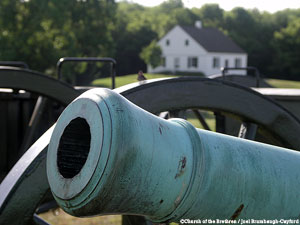Church of the Brethren leaders have released a statement following on a week of shootings that have rocked the nation. The statement is signed by Carol A. Scheppard, moderator of the Church of the Brethren Annual Conference; Samuel Sarpiya, moderator-elect of the Church of the Brethren Annual Conference; and Dale E. Minnich, interim general secretary of the Church of the Brethren. The statement follows in full:
When Lamentations Are Not Enough: A Statement for the Church of the Brethren
We are gathered in prayer with heavy and broken hearts. Our grief, refreshed by those who have died in the past week, is part of a longer lamentation. We are again praying with the families for whom the loss is a child, a parent, a spouse, a friend: we are praying for black families who have lost a loved one to police violence, we are praying for those who fear that someday it could be their family, and we are praying for the families of the police who were attacked and killed while they were working to make sure that a peaceful vigil could occur.
In a sense, we are praying for ourselves, a nation caught in a cycle of racialized violence. We are being asked to forgive and to be forgiven, though we barely understand our transgressions.
We Brethren are a people whose Christian faith finds expression through work–by rebuilding homes, building schools, replacing pipes, feeding the hungry, clothing the naked, and washing feet. Throughout our history, this is often how we have made peace. Today, we do not know how to be peacemakers for our country when the source of the violence seems as unpredictable as a storm–and like a storm, the violence seems destined to come again.
There is guidance in our own history: Just over 150 years ago, the country was embroiled in a deadly struggle about race. The Dunkers (as the Brethren were sometimes known), immersed in the Scriptures and studying the issues, were clear about two things: that we were against slavery and we were against all war. As if to test these seemingly contradictory convictions, the bloodiest battle was fought just yards from the doors of the Dunker church in Antietam. Commanders drew up plans of attack that used the meeting house as a landmark for their troop movements. Violence was indiscriminate and claimed the Union and the Confederate soldiers, the enslaved and the slave owners. And after blue and gray turned to blood red, the meeting house became a hospital. When the Dunker congregation was able to return to services, the walls of their church were bullet-ridden and the pews had been permanently stained with blood.

The small Dunker Church on the Civil War battlefield at Antietam is a symbol of the calling of the Brethren–to be a landmark of refuge during a time of violence.
La pequeña iglesia de Dunker en el campo de batalla de la guerra civil en Antietam es un símbolo de la vocación de los Hermanos – para ser un punto de referencia de refugio durante una época de violencia.
Though we are not in a great civil war, we are in a time of great civil violence. We are not divided by geographic lines such as north and south, nor political lines like Union and Confederate. But we are still divided by race. Our imaginations have been made anemic through fear, comfort, and statistics warped for political advantage. Our hearts have been hardened by a steady diet of media commentary thinly veiled as news that demonizes any person different from us. Yet these divides blur in the common hue of blood shed in violence and vanish when we face the call of Christ to love and serve all our neighbors.
In this season of escalating violence, the Brethren can again be a landmark of refuge like the simple bright walls of the Dunker meeting house on the Antietam battle field. It is not enough to add a hashtag or post an article on Facebook. We must return to the Scriptures that inform us about our work of caring for those who would be starved, stripped naked, and imprisoned. We must identify with the widow, the orphan, and the foreigner to our society. The Scriptures reminded earlier Christians of the historical and cultural forces that had defined and divided them as Jew, Gentile, slave, and master. Today, we need to be disciples who are able to recognize how deeply the powers and principalities of racial injustice have wounded our country–spiritually and physically. We need to understand what keeps us locked in this cycle of violence and we must search our souls for what it means to turn the other cheek, to go the extra mile, and to wash the feet of others.
As we continue to gather in prayer during the coming weeks and months, we have an opportunity to do the discipleship work that prepares us to be peacemakers so that we can confront the narratives of fear and violence. Even in the midst of this storm, we will be a place where healing and peace are possible, where people can name their fears, and where we can tend one another’s spiritual and physical wounds. For this is when we continue the work of Jesus, making us a people known for living peacefully, simply, and together.
Carol A. Scheppard, Moderator, Church of the Brethren Annual Conference
Samuel Sarpiya, Moderator-Elect, Church of the Brethren Annual Conference
Dale E. Minnich, Interim General Secretary, Church of the Brethren